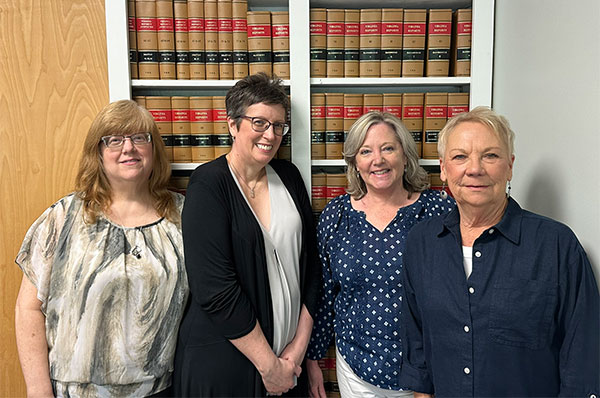Need Help
Got Unpaid Rent?
Let our team help you recover overdue rent payments
One of the most common issues between landlords and tenants is the tenant’s failure to pay rent in a timely manner. With a deep understanding of landlord-tenant law, our team of experienced attorneys is dedicated to assisting landlords with legal challenges related to unpaid rent. As a commercial or residential landlord, we understand that you made a significant investment in your rental property, and unpaid rent can significantly impact your income.
Navigating the complexities of landlord-tenant law can be daunting, especially when facing issues like unpaid rent. Consulting with a knowledgeable attorney who specializes in landlord-tenant law can provide clarity and guidance through these processes. We offer comprehensive legal consultations to assess your situation and provide tailored advice on the best course of action.
Because the eviction process is very specific, any error can result in the dismissal of the case. Don’t navigate these challenges alone. Schedule a free consultation with our experienced attorneys to discuss your legal options and start on the path to securing your rights and recover what you are owed.
Contact Us


Our Virginia landlord collection attorneys ensure landlords follow the proper legal procedures against their tenant in matters related to unpaid rent. Here’s an overview:
Lease Agreement Terms:
Virginia landlord/tenant laws have changed countless times since the start pandemic, and our team stays up-to-date and can advise landlords on the best path forward, starting with a well-written lease. Prevention is key to avoiding future disputes. We work with landlords to draft and review written leases that clearly outline the terms of tenancy, beginning and end date of the term, rent amount, due date, late fees, penalties for non-payment, and shift the cost of collection to the tenant. We also ensure the rental agreements comply with Virginia laws and protect our clients’ interests.
Notice Requirements:
Before taking legal action for unpaid rent, landlords must first provide tenants with a “pay or quit” notice, which is a letter notifying the tenant they have 5 days to either pay the rent or vacate the premises. Our attorneys can draft and send formal notices to tenants who failed to pay their rent. If the overdue rent is received, the tenant has the right to stay in the premises. In the event the tenant neither pays nor vacates by the end of the notice period, the landlord can proceed with an eviction action by filing an unlawful detainer.
Filing a Summons for Unlawful Detainer:
If the tenant fails to comply with the notice, the landlord may pursue an eviction action by having our attorneys file a summons for unlawful detainer. Our attorneys will file this claim in the General District Court of the county where the property is located. In the claim, landlords can request possession of the premises and any unpaid balance the tenant owes. An officer of the court will serve the tenant a summons, which will let them know the court date. If the tenant does not appear or does not contest the summons, the Court will enter a judgement for possession, rent, and fees. If the tenant does appear and contests, the case will progress to a trial where both parties present evidence of their claims and decide whether the landlord is entitled to recover possession of the premises.
Writ of Eviction:
After the 10-day appeal period, we ask the court for a “Writ of Eviction.” The court sends the Writ of Eviction to the Sheriff’s office, who has 30 days from the court’s signing to execute the document. The sheriff’s office proceeds with scheduling a date and time for the eviction. The sheriff’s office must give the tenant at least 72 hours advance notice of the eviction.
Judgement for Possession:
If the court rules in favor of the landlord, it will issue a judgement for possession, which means the landlord can take the next steps to evict the tenant. This judgement may also include court costs and attorney’s fees, if the lease specifies the landlord can recover reasonable attorney’s fees in the event of a breach of lease. The possession order gives the landlord the legal right to regain possession of the property. After a judgement, the tenant has a statutory right to appeal within ten (10) days by filing their notice of appeal.
Tenant Remedies:
Tenants who believe they have been unjustly charged or treated regarding unpaid rent may have legal remedies available to them. This could include asserting defenses in eviction proceedings, filing counterclaims against the landlord, or seeking damages for landlord misconduct.
Mediation and Settlement:
In some cases, landlords and tenants may choose to resolve disputes over unpaid rent through mediation or settlement negotiations. This can help avoid the time and expense of litigation while reaching a mutually acceptable resolution.
Legal Assistance: Both landlords and tenants facing issues related to unpaid rent charges may benefit from seeking legal assistance from an attorney specializing in landlord-tenant law. An attorney can provide guidance on rights, responsibilities, and legal options under applicable laws.

About
Our Collection Team
With over 140 years of experience among them, there’s nothing they can’t handle in their realm.

Manager
Our Collections Manager started in bank collections before moving into the legal realm. Collections Manager: After starting in bank collections, she moved into legal realm and has a total of 35 years.

Assistant Manager
Our Assistant Collections Manager has been in legal collections for 33 years.

Garnishment Specialist
Our Garnishment Specialist worked in a collection agency for over 20 years before moving into legal collections where she has been for 20 years.

Administrative Assistant
Collections Administrative Assistant: Previously, she worked as a Deputy Clerk in a Court for 30 years before joining the firm in 2020.
Let Our Team Help!
We're focused on recovering overdue business debts in Virginia.


